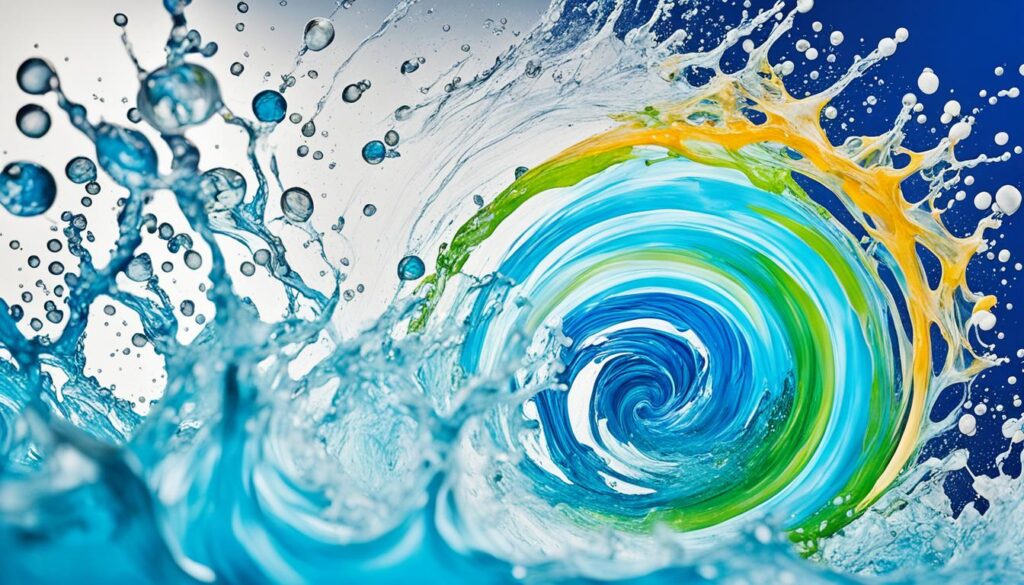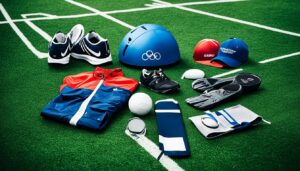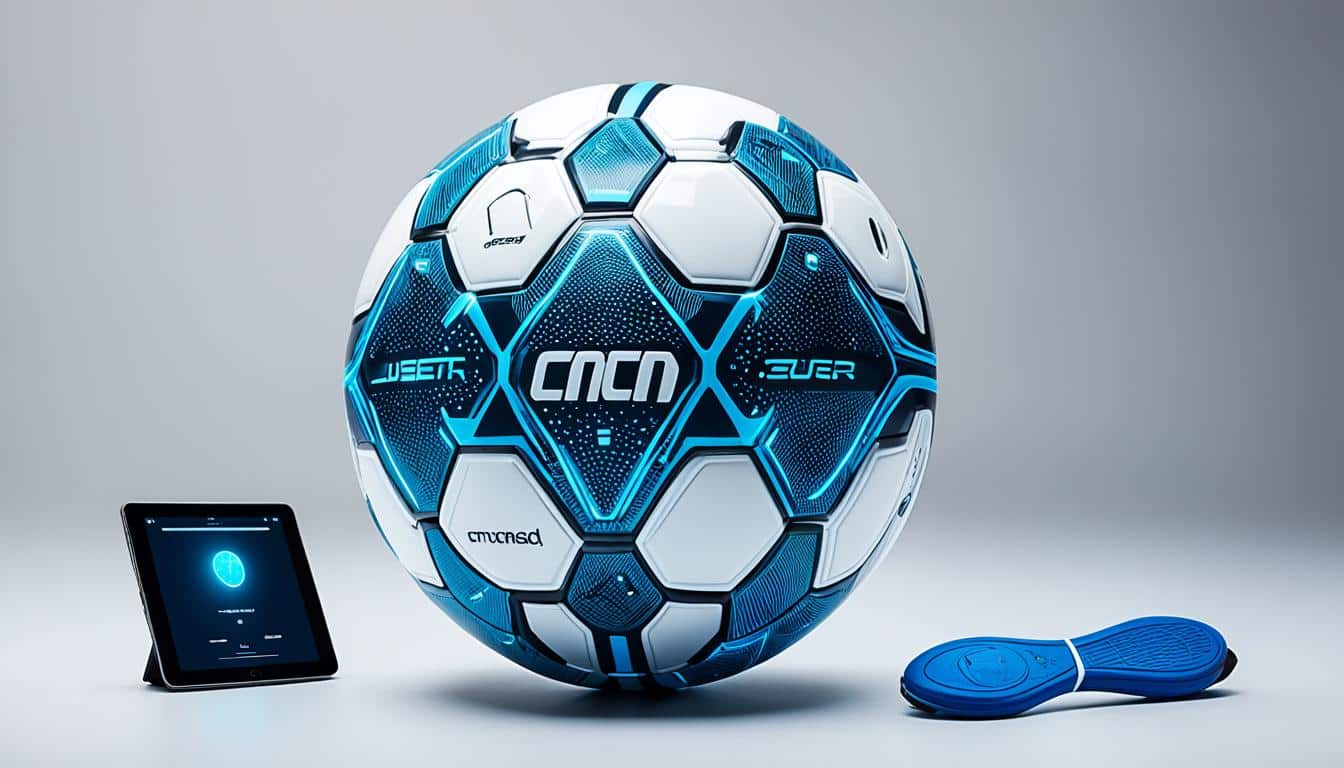Sports Nutrition: staying properly hydrated is key for top sports performance. Not drinking enough can hurt how well you do in sports. It can mess with your flexibility, how fast you are, your power to keep going, and more. Sports drinks with electrolytes help by getting nutrients to muscles and making sure signals get through right.
If you’re dehydrated, your body won’t work right. You may feel muscle cramps, tired, dizzy, or see dark yellow pee. All these are signs you need more fluids.
Key Takeaways
- Proper hydration is essential for optimal sports performance and preventing dehydration-related issues.
- Electrolytes like salt play a critical role in athletic performance by facilitating muscle function and nutrient absorption.
- Dehydration can negatively impact flexibility, speed, endurance, breathing, mood, and muscle function.
- Monitoring hydration status and replenishing fluids and electrolytes is crucial for athletes.
- Individualizing hydration strategies based on factors like sweat rate and environmental conditions is important.
Importance of Hydration for Athletes
Staying properly hydrated is key for athletes to perform their best. When an athlete gets dehydrated, their performance can take a hit in many ways. Not drinking enough water can make them less flexible and slow, lower their endurance, and make breathing harder. It can also affect how they feel, their focus, and cause headaches.
Impact on Athletic Performance
Dehydration really hits athletes hard. It decreases their flexibility, makes them react slower, and lowers their endurance and stamina. All this is because not having enough water messes with how their muscles work and the body’s natural cooling system.
Effects of Dehydration
The negative effects of not drinking water are many. They go beyond hurting physical performance. Dehydration can mess with an athlete’s mind, causing them to be less focused, more moody, and get headaches. It also bumps up the chances of getting heat-related problems that can sometimes be very serious.
Preventing Heat-Related Illnesses
Proper hydration helps athletes steer clear of serious heat-related issues. Drinking enough water before, during, and after exertion can keep their body temperature in check. This is vital for avoiding heat exhaustion and heat stroke, and it’s why good sports medicine and safe fitness practices matter so much for athletes.
Understanding Electrolytes

Electrolytes like sodium, potassium, calcium, and magnesium are key for athletes. They help push electrical signals to muscles, including the heart. Also, they aid in getting important nutrients into cells. When athletes work out, they lose these electrolytes through sweat and other ways. This makes it vital for them to replace these to stay at their best in sports nutrition.
Role of Electrolytes in Exercise
Keeping the right balance of electrolytes is crucial for fluid levels, muscle movement, and nerve work. Without this balance, athletes can face muscle issues, tiredness, and even heat sickness. That’s why they must take in enough electrolytes to meet their body’s needs when they are active in exercise.
Common Electrolytes for Athletes
The main electrolytes they should focus on are:
- Sodium: Keeps fluid levels in check and muscles working well
- Potassium: Needed for muscle actions and nerve signals
- Calcium: Helps keep bones strong and muscles healthy
- Magnesium: Is vital for making energy and relaxing muscles
For the best athletic performance, sports nutrition, and well-being, athletes must be sure they get enough of these important electrolytes.
Pre-Exercise Hydration Strategies
Having enough to drink before exercise is key for top performance. Athletes should eat a meal rich in carbohydrates, some protein, and low in fat about 3-4 hours before. This meal will give their muscles energy. They also need to drink water, milk, and 100% fruit juice to keep well-hydrated.
Timing and Amounts for Fluid Intake
30-60 minutes before exercise, an carbohydrate-rich snack gives a final energy push. This snack ensures their energy needs and nutritional needs are on point. It’s all about getting ready for the best sports performance
Choosing Appropriate Beverages
For pre-workout hydration, athletes can pick from many options. While water is the go-to for keeping energy and fuel high, milk and 100% fruit juice bring extra nutrients that are key. These help with athletic performance and
Hydration During Exercise
It’s key to stay hydrated during exercise to keep performing well. For activities under an hour, stick to water. However, if you’re working out for more than 60 minutes, consider sports drinks. They help replace lost electrolytes and give you carbs for energy.
Recommended Fluid Intake
The American Council on Exercise says to sip 7-10 ounces of fluid every 10-20 minutes when you’re active. Doing this keeps athletes hydrated, maintains body temperature, and helps athletic performance stay high.
Sports Drinks vs. Water
For long-lasting or intense exercise lasting over an hour, go for sports drinks. They’re great for restoring electrolytes and offer carbs for your muscles. Yet, for short or less intense exercises, water should be your go-to.
| Fluid Type | Activity Duration | Key Benefits |
|---|---|---|
| Water | Under 60 minutes | Optimal hydration for shorter exercises |
| Sports Drinks | Over 60 minutes | Replenish electrolytes and provide carbohydrates for fuel |
Post-Exercise Hydration and Recovery
After working out, it’s crucial to drink enough and eat well for your body to recover. This helps get ready for the next round of exercises or a big game. Athletes should aim to eat a mix of carbohydrates and protein within an hour of exercising. This mix helps your body refill its energy and fix muscles.
Rehydrating After Exercise
It’s important to drink 16-24 ounces of water for every pound lost after sweating. This amount will help you balance your fluid levels and recover faster.
Replenishing Electrolytes
Athletes must focus on replacing lost electrolytes like sodium, potassium, and magnesium. These disappear when you sweat. Eating foods and drinking beverages that are rich in electrolytes can help.
Role of Nutrition in Recovery
Eating well after working out helps your body recover and get strong again. Choosing the right food can refill your energy, build and fix muscles, and improve how you perform. This is important for the serious athlete.
Sports Nutrition
For athletes, eating right is key. It helps their bodies work better, grow muscle, and do their best. Carbs, proteins, and fats are crucial for their diet.
Macronutrient Needs for Athletes
Carbs are a top choice for muscle energy. They give the push needed for hard workouts and long runs. Proteins help muscles heal and grow. And fats provide slow-burning energy and support body tasks.
Micronutrient Requirements
Vitamins and minerals are also crucial for top performance. They keep metabolism in check, help the immune system, and aid in nutrient absorption.
Timing of Nutrient Intake
When athletes eat is vital too. Having the right nutrients before, during, and after exercise improves performance and well-being.
| Macronutrient | Role in Sports Nutrition | Recommended Intake |
|---|---|---|
| Carbohydrates | Primary energy source for working muscles | 3-12 g per kg of body weight, depending on training intensity and duration |
| Protein | Aids in muscle recovery and growth | 1.2-2.0 g per kg of body weight, depending on training load and goals |
| Fats | Provide a more sustained energy source and support various bodily functions | 20-35% of total daily caloric intake |
“Proper sports nutrition is crucial for athletes to fuel their bodies, build and repair muscle, and optimize performance.”
A balanced and scientifically-backed diet boosts an athlete’s performance and recovery. It meets their specific nutritional requirements.
Individualizing Hydration Needs

Every athlete is different when it comes to hydration needs. This is because of several factors> that are unique to each person. While there are basic rules to follow, athletes need to watch how much they drink and match it with their specific needs. This way, they can make sure to drink the right amount for the best sports and performance nutrition.
Factors Affecting Hydration Requirements
Many things can change how much an athlete should drink. This includes how much they sweat, the weather, what they wear, and the type of exercise they do. Things like health conditions and the medicines they take, as well as growing up, also matter. Evidence shows we should look at all these things to decide how much to drink to stay healthy and perform our best.
Monitoring Hydration Status
To figure out how much they need to drink, athletes should check their own hydration status. They can do this by weighing themselves before and after being active, looking at their urine, and paying attention to signs of not enough water. This smart way helps athletes adjust their sports nutrition plans. It helps them drink just the right amount to stay in good shape and at their peak while playing.
Hydration for Specific Sports
Hydration needs greatly change between sports. Endurance activities like running, cycling, and swimming make you sweat a lot. This means you lose both fluids and important electrolytes. Hence, you need to drink more to replace them.
Team sports such as soccer, basketball, and football also bump up your fluid needs. Their mix of intense actions and breaks can quickly use up your hydration. So, staying well-hydrated is vital for any player in these games.
Endurance Sports
Long-distance runners, cyclists, and swimmers need to drink a lot. These sports make you sweat profusely. You lose fluids and electrolytes as you go.
Staying hydrated keeps blood flowing well. It also helps regulate your body temperature and support your muscles during the event.
High-Intensity Interval Training
HIIT workouts are all about fast, hard work followed by short breaks. This style can quickly drain your body of fluids and electrolytes.
Keeping your hydration in check is key to sustaining your workout. This helps in keeping your strength and endurance up until the end.
Team Sports
In team sports, quick actions come with breaks in between. The pace sometimes varies, but the need for hydration doesn’t. It’s easy to lose fluids and electrolytes, which impacts your performance.
Drinking enough can help you keep up with the game’s speed, your sharpness, and good decisions.
Also Read: Best Vitamins To Bolster Your Immune System
Hydration Supplements and Products
Besides water and sports drinks, there are many other products to keep athletes hydrated. These include supplements and items that replace lost electrolytes from sweat. They help a lot in endurance sports, high-intensity training, and team games that increase fluid and electrolyte needs.
Electrolyte Tablets and Powders
Adding electrolyte tablets or powders to water is a smart move for athletes. It boosts their minerals like sodium, potassium, and magnesium intake. This is important since these minerals are lost through sweat. They help keep muscles working well, regulate body heat, and aid in nutrient uptake.
Sports Gels and Chews
For athletes who need endurance, sports gels and chews are key. They mix carbohydrates and electrolytes for a quick energy boost. These items are easy to carry and eat. They help support strong athletic performance and recovery after long workouts.
FAQs
Q: How important is proper nutrition for exercise performance?
A: Proper nutrition is crucial for exercise performance as it provides the necessary fuel and nutrients for muscles to work efficiently.
Q: What role do carbohydrates play in sports nutrition?
A: Carbohydrates are a primary fuel source for athletes, providing energy for high-intensity exercise and helping to maintain glycogen stores in muscles.
Q: Why is hydration important during exercise?
A: Hydration is vital during exercise to prevent dehydration, maintain performance, regulate body temperature, and support overall health.
Q: How can I stay hydrated during exercise?
A: To stay hydrated during exercise, drink water before, during, and after physical activity, and consider sports drinks for longer or more intense workouts.
Q: What is the role of protein in sports nutrition?
A: Protein is essential for muscle repair, growth, and recovery, making it important for athletes looking to optimize performance and maintain muscle mass.
Q: Should I consult a dietitian for sports nutrition advice?
A: Consulting a registered dietitian or sports nutritionist can provide personalized nutrition strategies tailored to your specific needs and goals as an athlete.
Q: How can nutrition impact exercise performance?
A: Proper nutrition can have a significant impact on exercise performance by providing the necessary nutrients and energy for muscles to function optimally during physical activity.
Source Links
- https://familydoctor.org/athletes-the-importance-of-good-hydration/
- https://www.nationwidechildrens.org/specialties/sports-medicine/sports-medicine-articles/fueling-and-hydrating-before-during-and-after-exercise
- https://www.hopkinsmedicine.org/health/wellness-and-prevention/nutrition-and-fitness/sports-and-hydration-for-athletes





